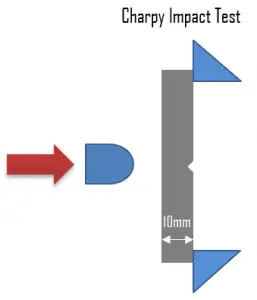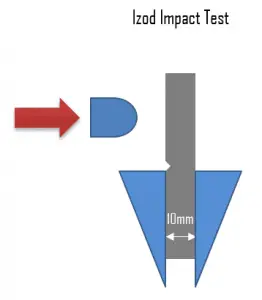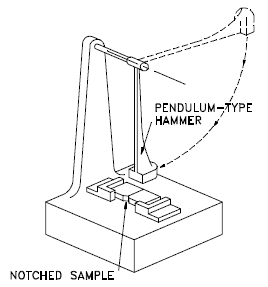Notch toughness is measure of the energy absorbed (impact energy) during the fracture of a specimen (in the presence of a flaw – usually a V-notch) of standard dimensions and geometry when subjected to very rapid (impact) loading. As mentioned previously, in the presence of a flaw, such as a notch or crack, a material will likely exhibit a lower level of toughness. Charpy and Izod impact tests are used to measure this parameter, which is important in assessing the ductile-to-brittle transition behavior of a material. Similarly as for tensile toughness, notch toughness is measured in units of joule per cubic metre (J·m−3) in the SI system, but in this case we are measuring the area at the notch position.
Measuring Toughness – Impact Tests
 As was written, toughness can be measured by the Charpy test or the Izod test. These two standardized impact tests, the Charpy and the Izod, are used to measure the impact energy (sometimes also termed notch toughness). The Charpy V-notch (CVN) technique is most commonly used. Both of these tests use a notched sample of defined cross-section. For these dynamic loading conditions and when a notch is present, we are using notch toughness. The location and shape of the notch are standard. The points of support of the sample, as well as the impact of the hammer, must bear a constant relationship to the location of the notch.
As was written, toughness can be measured by the Charpy test or the Izod test. These two standardized impact tests, the Charpy and the Izod, are used to measure the impact energy (sometimes also termed notch toughness). The Charpy V-notch (CVN) technique is most commonly used. Both of these tests use a notched sample of defined cross-section. For these dynamic loading conditions and when a notch is present, we are using notch toughness. The location and shape of the notch are standard. The points of support of the sample, as well as the impact of the hammer, must bear a constant relationship to the location of the notch.
 The tests are conducted by mounting the samples as shown in the figure and allowing a pendulum of a known weight to fall from a set height. The height from which the pendulum fell, minus the height to which it rose after deforming the specimen, multiplied by the weight of the pendulum is a measure of the energy absorbed by the specimen as it was deformed during the impact with the pendulum. The greater the amount of energy absorbed by the specimen, the smaller the upward swing of the pendulum will be and the tougher the material is.
The tests are conducted by mounting the samples as shown in the figure and allowing a pendulum of a known weight to fall from a set height. The height from which the pendulum fell, minus the height to which it rose after deforming the specimen, multiplied by the weight of the pendulum is a measure of the energy absorbed by the specimen as it was deformed during the impact with the pendulum. The greater the amount of energy absorbed by the specimen, the smaller the upward swing of the pendulum will be and the tougher the material is.
Indication of toughness is relative and applicable only to cases involving exactly this type of sample and method of loading.

A sample of a different shape will yield an entirely different result. Notches confine the deformation to a small volume of metal that reduces toughness. The Izod impact test is similar to the Charpy impact test but uses a different arrangement of the specimen under test. The Izod impact test differs from the Charpy impact test in that the sample is held in a cantilevered beam configuration as opposed to a three-point bending configuration.
We hope, this article, Notch Toughness, helps you. If so, give us a like in the sidebar. Main purpose of this website is to help the public to learn some interesting and important information about materials and their properties.